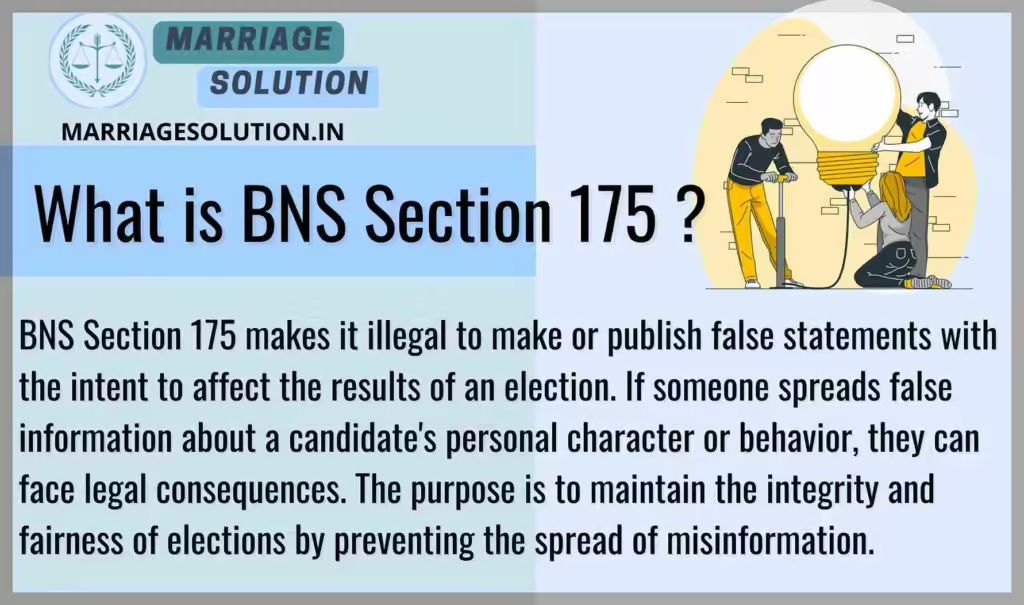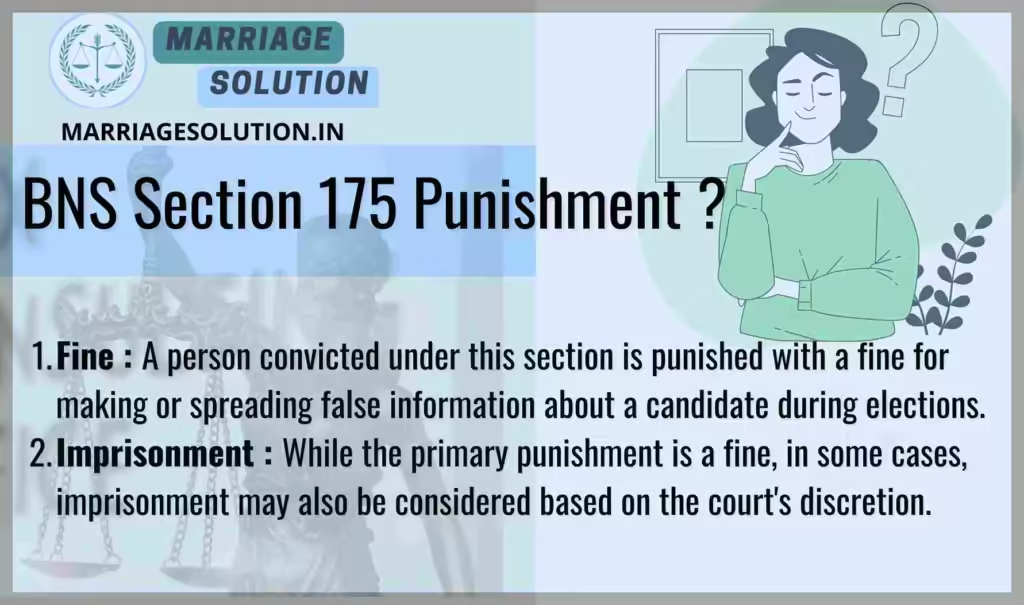Introduction of BNS 175
Fair elections depend on truthful campaigns and informed voter choice. To safeguard this principle, Section 175 of the Bharatiya Nyaya Sanhita (BNS), 2023, prohibits making or publishing false statements about a candidate’s personal character or conduct with the intent to influence election results. This provision ensures that candidates are judged on facts and performance rather than lies or misinformation. By targeting false propaganda, the law strengthens public confidence in elections and promotes integrity in democratic processes.
The Bharatiya Nyaya Sanhita (BNS) Section 175 replaces the old Indian Penal Code (IPC) Section 171-G.
What is BNS Section 175 ?
BNS Section 175 makes it illegal to make or publish false statements with the intent to affect the results of an election. If someone spreads false information about a candidate’s personal character or behavior, they can face legal consequences. The purpose is to maintain the integrity and fairness of elections by preventing the spread of misinformation.

False statement in connection with an election
Whoever makes or publishes any statement purporting to be a statement of fact which is false, in relation to the personal character or conduct of any candidate, shall, if such statement is made or published with intent to affect the result of an election, be punished with fine.
Explanation of Section 175
Section 175 deals with the offence of making or publishing false statements about candidates during elections. It is designed to maintain fairness in the democratic process by punishing those who attempt to influence voter opinion with lies or misinformation.
- Scope of the Law → Applies to false statements about a candidate’s personal character or personal conduct, not political views or promises.
- Intent Matters → The false statement must be made with the purpose of affecting the outcome of an election.
- Publication Covered → Includes statements made verbally, printed in newspapers, spread through pamphlets, social media posts, or digital platforms.
- Punishment → Fine is the primary punishment, but in some circumstances, imprisonment may also be imposed at the court’s discretion.
- Objective → To prevent misuse of falsehoods and maintain voter confidence in the fairness of elections.
Offence Classification under BNS Section 175
- Cognizability → Non-cognizable (police cannot act without court permission).
- Bailable? → Bailable (accused has the right to seek bail).
- Compoundable? → Non-compoundable (case cannot be settled privately).
- Trial Court → Triable by a Magistrate of the First Class.
Key Elements of Section 175
- Falsehood Required → The statement must be false in fact.
- About a Candidate → Must concern a candidate’s personal character or conduct.
- Intent to Influence → Made with the intent of affecting election results.
- Publication Included → Oral, written, printed, or digital statements are covered.
- Punishment → Fine (with possibility of imprisonment depending on seriousness).
- Election Context → The falsehood must be linked to an election campaign or process.
- Non-cognizable → Requires court sanction for police action.
- Bailable → Accused can secure release on bail.
- Non-compoundable → Cannot be privately withdrawn or settled.
- Magistrate Trial → Heard by Magistrate of the First Class.
Examples of BNS Section 175
Example 1 – False Accusation of Corruption:
During an election, a rival candidate spreads a rumor that their opponent has accepted illegal bribes, knowing this is false. This is punishable under Section 175 because it is a false statement intended to damage the candidate’s reputation and influence voters.
Example 2 – Fake News Publication:
A local newspaper knowingly publishes an untrue story claiming that a candidate was previously arrested for theft. The publication of this false statement to mislead voters is an offence under Section 175.
Why Section 175 is Important
- Protects Democratic Integrity → Ensures voters base decisions on truth, not lies.
- Prevents Character Assassination → Shields candidates from malicious falsehoods.
- Regulates Election Campaigns → Keeps campaigns fair and issue-based.
- Deters Misinformation → Penalises those who spread fake news in elections.
- Strengthens Trust → Voters trust the system when candidates are judged on facts, not false rumours.
Section 175 BNS Overview
BNS Section 175 punishes individuals who make or publish false statements about an election candidate’s personal character or conduct with the intent to affect the result of an election. It aims to prevent the use of lies and misinformation in elections, maintaining fairness and integrity.
BNS Section 175 :10 Key Points
- False Statement About Candidates
The law is applicable when someone makes a false statement about a candidate’s personal character or conduct during an election. - Intention to Influence the Election
For the offense to occur, the person must have the intent to influence voters or the outcome of the election through the false statement. - Publishing False Information
The offense includes not only making false statements but also publishing false information, such as in newspapers, online platforms, or pamphlets. - Punishment with Fine
The primary punishment for this offense is a fine, aimed at financially penalizing the wrongdoer. - Non-Cognizable Offense
The offense is classified as non-cognizable, meaning that the police cannot arrest the person without a court-issued warrant. - Bailable Offense
Since it is a bailable offense, the person accused of violating this section can apply for bail and be released from custody while waiting for trial. - Non-Compoundable Offense
The offense is non-compoundable, which means it cannot be settled or withdrawn by the complainant outside of court. The legal process must continue. - Tried by Magistrate
The case will be tried by a Magistrate of the First Class, who will determine the punishment based on the evidence presented. - Scope of Falsehood
The law specifically covers statements about the personal character or conduct of a candidate, not general political opinions or campaign promises. - Protection of Election Integrity
The main objective of this section is to ensure the fairness and integrity of elections, preventing false information from manipulating voters.
Examples of BNS Section 175
- Example 1: False Accusation of Corruption
A person spreads a rumor during an election that a candidate is involved in a corruption scandal, knowing the information is false. The rumor is intended to turn voters against the candidate. This is an offense under BNS Section 175, and the person responsible can be fined for spreading the false statement. - Example 2: Fake News Publication
A local newspaper publishes a story claiming that a candidate has been arrested for a crime, although the publisher knows the story is untrue. This false publication aims to damage the candidate’s reputation before the election. The publisher would be guilty under BNS Section 175 and could face a fine.
BNS 175 Punishment
Fine
A person convicted under this section is punished with a fine for making or spreading false information about a candidate during elections.
Imprisonment
While the primary punishment is a fine, in some cases, imprisonment may also be considered based on the court’s discretion.

BNS 175 bailable or not ?
BNS Section 175 is a bailable offense, meaning the accused can apply for bail and be released while awaiting trial. This allows the person to avoid detention while their case is ongoing.
Comparison Table – BNS Section 175 vs IPC Section 171G
| Section | What it Means | Punishment | Bail | Cognizable? | Trial By |
|---|---|---|---|---|---|
| BNS Section 175 | Deals with making or publishing false statements about a candidate’s personal character or conduct with the intent to influence election results. | Punishable with fine; in some cases, imprisonment may also be imposed at the court’s discretion. | Bailable (accused can seek bail) | Non-Cognizable (police need court’s permission to act) | Magistrate of the First Class |
| IPC Section 171G (Old) | Earlier provision punishing those who make or publish false statements about a candidate’s personal character or conduct during elections. | Punishable with fine only (no imprisonment provision). | Bailable | Non-Cognizable | Magistrate of the First Class |
BNS Section 175 FAQs
What is BNS Section 175?
BNS Section 175 makes it illegal to make false statements about a candidate with the intent to influence election results.
What kind of statements are covered?
The section applies to false statements related to the personal character or conduct of a candidate.
What is the punishment under this BNS 175 section?
A person found guilty is punished with a fine, and in some cases, imprisonment.
BNS 175 a bailable offense?
Yes, the offense is bailable, allowing the accused to seek bail.
Who tries cases under Section 175?
These cases are triable by a Magistrate of the First Class.
Conclusion
BNS Section 175 acts as a safeguard against misinformation in elections by punishing the making or publishing of false statements about a candidate’s character or conduct. While similar to IPC Section 171G, the BNS provision provides clearer language and allows the court greater discretion in imposing penalties. By deterring false propaganda, this section ensures that elections are fought on genuine issues and that voters make decisions based on truth, thereby strengthening the democratic process.
Need Legal Support?
If you’re facing court proceedings, marriage-related issues, or any legal matter, our team at Marriage Solution – Lawyer Help is ready to guide you. Just complete our easy online enquiry form, and we’ll connect you with the right legal assistance tailored to your needs. helpful. By completing our enquiry form and submitting it online, we can provide customized guidance to navigate through the process.
Finished with BNS 175 ? Continue exploring the next provisions of the Bharatiya Nyaya Sanhita (BNS), 2023. Each section includes explanations, examples, and plain-language breakdowns for easy understanding.
- BNS 176 : Illegal payments in connection with an election.
- https://marriagesolution.in/bns_section/bns-176/
- BNS 177 : Failure to keep election accounts.
- https://marriagesolution.in/bns_section/bns-177/
Chapter X – Of Offences Relating To Coin, Currency Notes, Bank Notes, And Government Stamps
- BNS 178 : Counterfeiting coin, government stamps, currency-notes or bank-notes.
- https://marriagesolution.in/bns_section/bns-178/
- BNS 179 : Using as genuine, forged or counterfeit coin, Government stamp, currency-notes or bank notes.
- https://marriagesolution.in/bns_section/bns-179/
- BNS 180 : Possession of forged or counterfeit coin, Government stamp, currency-notes or bank-notes.
- https://marriagesolution.in/bns_section/bns-180/
Full IPC Section List: https://marriagesolution.in/ipc-section-list
All Indian Law & Blogs: https://marriagesolution.in/indian-law/
Full BNSS Section List: https://marriagesolution.in/bnss_section-list
